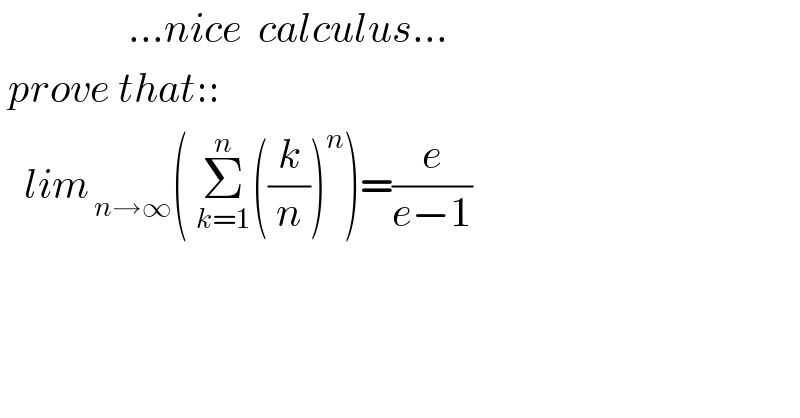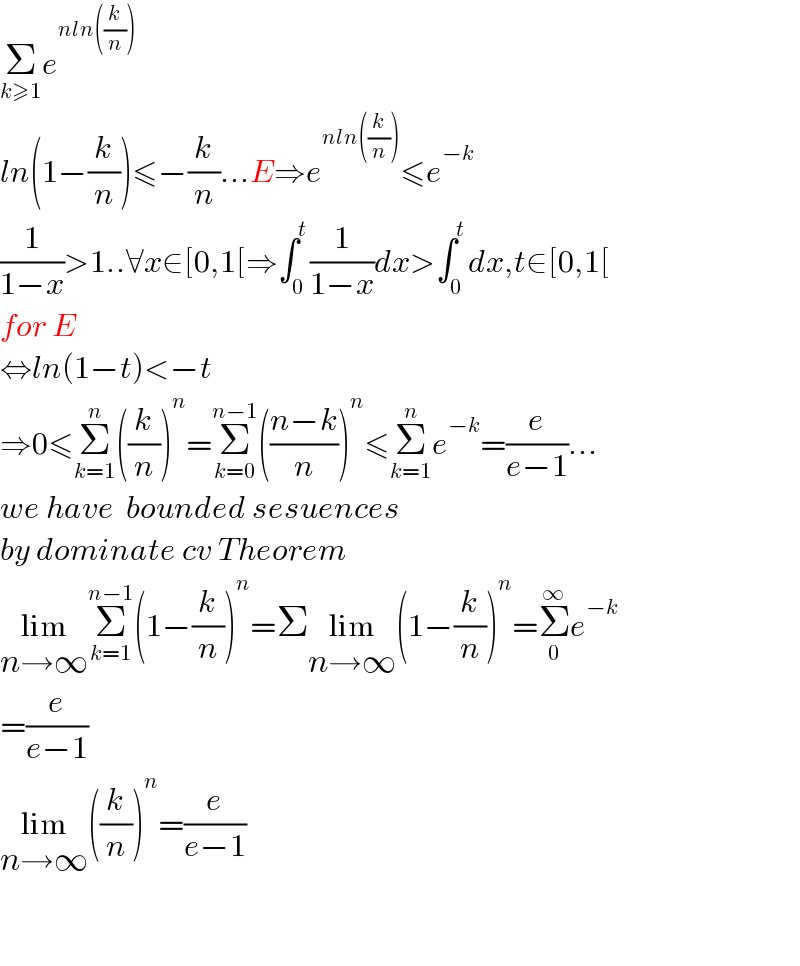
Question Number 127085 by mnjuly1970 last updated on 26/Dec/20

$$\:\:\:\:\:\:\:\:\:\:\:\:\:\:\:\:...{nice}\:\:{calculus}... \\ $$$$\:{prove}\:{that}:: \\ $$$$\:\:\:{lim}_{\:{n}\rightarrow\infty} \left(\:\underset{{k}=\mathrm{1}} {\overset{{n}} {\sum}}\left(\frac{{k}}{{n}}\right)^{{n}} \right)=\frac{{e}}{{e}−\mathrm{1}} \\ $$$$ \\ $$
Commented by mnjuly1970 last updated on 27/Dec/20

$$\:\:\:\:{thanks}\:\:{alot}... \\ $$
Answered by mindispower last updated on 27/Dec/20

$$\underset{{k}\geqslant\mathrm{1}} {\sum}{e}^{{nln}\left(\frac{{k}}{{n}}\right)} \\ $$$${ln}\left(\mathrm{1}−\frac{{k}}{{n}}\right)\leqslant−\frac{{k}}{{n}}...{E}\Rightarrow{e}^{{nln}\left(\frac{{k}}{{n}}\right)} \leqslant{e}^{−{k}} \\ $$$$\frac{\mathrm{1}}{\mathrm{1}−{x}}>\mathrm{1}..\forall{x}\in\left[\mathrm{0},\mathrm{1}\left[\Rightarrow\int_{\mathrm{0}} ^{{t}} \frac{\mathrm{1}}{\mathrm{1}−{x}}{dx}>\int_{\mathrm{0}} ^{{t}} {dx},{t}\in\left[\mathrm{0},\mathrm{1}\left[\right.\right.\right.\right. \\ $$$${for}\:{E}\: \\ $$$$\Leftrightarrow{ln}\left(\mathrm{1}−{t}\right)<−{t} \\ $$$$\Rightarrow\mathrm{0}\leqslant\underset{{k}=\mathrm{1}} {\overset{{n}} {\sum}}\left(\frac{{k}}{{n}}\right)^{{n}} =\underset{{k}=\mathrm{0}} {\overset{{n}−\mathrm{1}} {\sum}}\left(\frac{{n}−{k}}{{n}}\right)^{{n}} \leqslant\underset{{k}=\mathrm{1}} {\overset{{n}} {\sum}}{e}^{−{k}} =\frac{{e}}{{e}−\mathrm{1}}... \\ $$$${we}\:{have}\:\:{bounded}\:{sesuences} \\ $$$${by}\:{dominate}\:{cv}\:{Theorem}\: \\ $$$$\underset{{n}\rightarrow\infty} {\mathrm{lim}}\underset{{k}=\mathrm{1}} {\overset{{n}−\mathrm{1}} {\sum}}\left(\mathrm{1}−\frac{{k}}{{n}}\right)^{{n}} =\Sigma\underset{{n}\rightarrow\infty} {\mathrm{lim}}\left(\mathrm{1}−\frac{{k}}{{n}}\right)^{{n}} =\underset{\mathrm{0}} {\overset{\infty} {\sum}}{e}^{−{k}} \\ $$$$=\frac{{e}}{{e}−\mathrm{1}} \\ $$$$\underset{{n}\rightarrow\infty} {\mathrm{lim}}\left(\frac{{k}}{{n}}\right)^{{n}} =\frac{{e}}{{e}−\mathrm{1}} \\ $$$$ \\ $$$$ \\ $$
